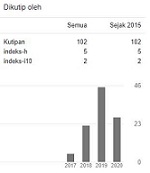EMOTIONAL INTELLIGENCE IN SPEAKING CLASS AT MADURA UNIVERSITY
Abstract
Emotional intelligence is the ability to improve thinking and understanding of interpersonal dynamics through incorporating intelligence, empathy, and emotion in everyday life. emotions will give adverse effects on an individual if the emotions are not being controlled properly. Therefore, this study aims to describe the emotions that arise when students speak English and how students can control their emotions when speaking. This study uses a qualitative descriptive method with field notes observation and questionnaires to obtain data. The informants used purposive sampling with the category of students being the most able to speak in class, resulting six English students at the Madura University as the sample. The results of this study are the characteristics of the emotions that exist in students in the form of positive emotions and negative emotions. Negative emotions in students are fear, lack of confidence, anxiety, and shyness when speaking English. while the positive emotion of students are smile and enjoy. they regulate their emotions with the five aspects of emotional intelligence. self-awareness, self-regulations, motivation, empathy, and social skills.
Keywords
References
Ary: Educational Research, (2010:431) http://repository.unmas.ac.id/medias/journal/EBK-00121.pdf
Corneanu, Ciprian, Fatemeh Noroozi, Dorota Kaminska, Tomasz Sapinski, Sergio Escalera, and Gholamreza Anbarjafari, Survey on Emotional Body Gesture Recognition, IEEE Transactions on Affective Computing, January, 2018 https://doi.org/10.1109/TAFFC.2018.2874986
Collins, Cristopher (2014). Emotional Intelligence and the qualitative researcher. Nomer 13, 94.
Derakhshan, A., Khalili, A. N., & Beheshti, F. (2016). Developing EFL Learner’s Speaking Ability, Accuracy and Fluency. English Language and Literature Studies, 6(2), 177. https://doi.org/10.5539/ells.v6n2p177
FeldmanBarret(2017:180)https://psikologi.uma.ac.id/wpcontent/uploads/2018/12/KECERDASAN-EMOSI.pdf
Goleman, Daniel. the power of emotional intelligence. Jakarta, 2011 PT Gramedia Pustaka Utama.
Goleman, Daniel . Kecerdasan emosi untuk mencapai puncak prestasi. 2016 Jakarta: PT Gramedia Pustaka Utama.
Gery, Isabelle, Raphaële Miljkovitch, Sylvie Berthoz, and Robert Soussignan, Empathy and Recognition of Facial Expressions of Emotion in Sex Offenders, Non-Sex Offenders and Normal Controls, Psychiatry Research, 165.3 (2009), 252–62https://doi.org/10.1016/j.psychres.2007.11.006 Goetz, J. L., Keltner, D., & Simon-Thomas, E. (2010). Compassion: An evolutionary analysis and empirical review. Psychological Bulletin, 136(3), 351–374. https://doi.org/10.1037/a0018807
Jessica & Doris ( 2007) https://eprints.umm.ac.id/60298/1/CHAPTER%20II.pdf
John Daniel K.J: How To Control Your Felling and live happily, January , 2019
Keltner, Dacher, Disa Sauter, Jessica Tracy, and Alan Cowen, Emotional Expression: Advances in Basic Emotion Theory’, Journal of Nonverbal
Behavior, 43.2 (2019), 133–60 https://doi.org/10.1007/s10919-019-00293-3
Kant, Ravi, Emotional Intelligence: A Study on University Students, Journal of Education and Learning (EduLearn), 13.4 (2019), 441–46 https://doi.org/10.11591/EDULEARN.V13I4.13592
Mayer, J.D, and P. Saloyev., 2003. Emotional Intelligence Imagination Cognition and Personality. New York : Basic Books
Mayer, John D., Peter Salovey, and David R. Caruso, Emotional Intelligence: New Ability or Eclectic Traits?, American Psychologist, 63.6 (2008), 503– 17 https://doi.org/10.1037/0003-066X.63.6.503
Meiva Eka Sri Sulistyawati, The Effects Of Emotional Intelligence On students’Speaking Skills, Journal of EnglishLanguage Education, 1.2 (2018), : 39-66 https://doi.org/10.1017/CBO9781107415324.004
DOI: 10.53712/ellite.v8i1.2658
Refbacks
- There are currently no refbacks.







